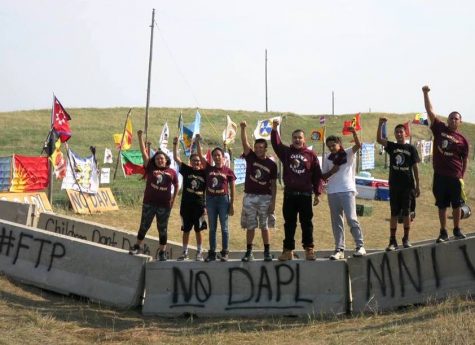Friends Hosts the Fifth Annual Israel-Palestine Panel
Awards 2014
“First ground rule: helping students to learn is center stage today. Second ground rule: remember that we are all at different places in our journey with this work. And finally, be respectful.” With these words by Scott Rhodewalt, teacher and organizer of the conference, the fifth annual Israeli-Peace Colloquium began.
Rick Grier Reynolds, former history department chair, created The Israeli-Peace Colloquium in early 2010. The event centers on a panel of experts that come to answer Peace students’ questions about Israel and Palestine. Since Grier Reynolds’ retirement, Rhodewalt has taken over as organizer of the conference.
Nine speakers served on the panel this year, each with a wide range of knowledge and experience relating to the Israeli-Palestinian conflict. Some of the panelists were strongly pro-Palestine, others strongly pro-Israel, and others did not take sides, but rather promoted peace for both countries.
The panelists were first asked to share a two-minute vision of Israelis and Palestinians five years from now. Rabbi Krantz, a civil rights activist, believes that in five years, the parties in the conflict will be forced to come up with a solution: “We have some choices to deal with. Five years from now, Israelis and Palestinians are going to be sharing the same land. They are going to be drinking water that they will figure out how to share. It does not matter if there is war or peace, they are going to be on the land together. They are going to raise their children, either segregated or integrated. They are going to figure out what to do with the physical wall, and the psychological wall of estrangement that is between them.”
Other panelists did not have such an optimistic outlook. One of the panelists, a student from Ramallah, spent this year studying in America. “My vision for 2019 is that more and more settlements are being built in the West Bank, even though they are not legal. Palestinians are being kicked out of their houses, which will cause tension between Israelis and Palestinians. It is going to be like this for a lot of years.”
A former Israeli soldier, and current certified Israeli tour guide spoke to the justification of Jewish people on the land that is Israel: “I know that I am not religious but I am still Jewish. Judaism is not a religion; it is an ethnicity. There is room for Judaism in Israel. Even though my grandparents aren’t from Israel, my ancestors are.” He later called for a harmonious solution between both the Israelis and the Palestinians, where both groups would sit down and peacefully talk together in order to solve the conflict.
Sandy Rea, a psychologist who lived in the Middle East and has served on the panel for years, spoke to the methods of gaining peace: “I believe if you want peace, you work for justice, if you want justice you are for equality. Understand that there is forgiveness that has to be a part of these things, as well as compassion. Peace cannot come when people are denying the rights of others to exist. Peace cannot come when there are two different political enemies vying for Palestine. Peace cannot come when human rights abuses continue. Justice cannot be built on fear. Reducing fear will take compassion, forgiveness and peace.”
When asked why he finds this colloquium important, Rhodewalt replied, “It brings to life what for so many students would otherwise only be a dry, distant conflict. Once they learn about their own country’s pivotal role in continuing the status quo, it’s easier to imagine that several students attending this colloquium will bring about change as adults.”
Freshman Peace student, Gustavo Silveira, gave a similar response: “I think that this colloquium is very important. We have been looking at both narratives of this story, and this is the culmination of all of that. You see the culmination of experts in the Israel Palestine conflict, and their unique and individual experiences are what will allow us to theoretically come up with solutions for the conflict.”
This colloquium, unique to Wilmington Friends School, can be emulated on a larger scale. The first step according to Rhodewalt is “for Delaware’s congressional delegation in Washington to commit to attend. The price of admission, however, is that these three political leaders agree to learn both narratives, as rigorously as our ninth graders learn both the Israeli and Palestinian narratives during the month of April each year.” The Israeli-Palestinian Peace colloquium is scheduled to continue next year on May 8th in the new theater, and hopefully we will see potential for a more peaceful tomorrow between Israel and Palestine.



































